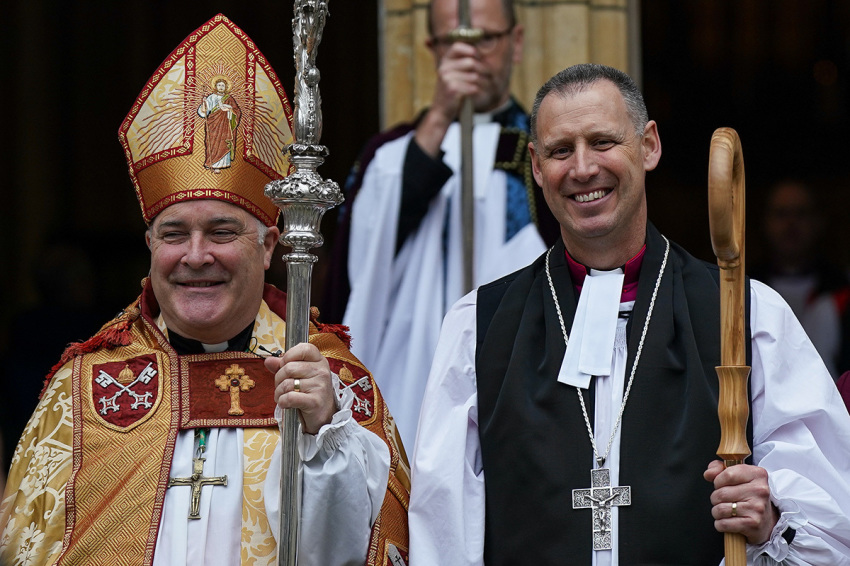‘Misunderstood’: Archbishop says don’t stop praying ‘Our Father’ but be sensitive

The Archbishop of York Stephen Cottrell has issued a clarifying statement on his previous comments regarding the use of the phrase “Our Father” in Christian prayer, insisting Christians should continue with its use while also being “sensitive” to individuals who have been victims of abuse perpetrated by men.
The archbishop’s earlier comments had sparked controversy, with him suggesting that the reference to God as “Our Father” might be “problematic” for people who have suffered abuse from fathers or male clergy. His statement was made during his presidential address to the General Synod, the Church of England’s legislative body, earlier this month.
Cottrell’s initial comments, which suggested a need for sensitivity in language used to refer to God, stirred a mixed reaction within the Anglican denomination. Liberal and feminist clergy members were largely in agreement, but conservative Christians criticized the archbishop for seemingly taking cues from modern culture rather than scriptural tradition.
Seeking to address the confusion surrounding his previous statements, the archbishop wrote a piece for The Telegraph.
“A few weeks ago, I found myself a little misunderstood when I pointed out that some people who have never known a father present in their life, or worse, been abused or neglected by their father, may find this word challenging,” he wrote. “But what I wasn’t saying is that we should stop using the word — simply that we need to be sensitive as we lead people in prayer.”
He reinforced that Christians should continue praying to God as “Our Father,” but be mindful of the implications that such language might have on abuse survivors or a bad relationship with their earthly father.
The archbishop also underscored the need for healing among victims of abuse, and the Church’s role in facilitating this healing. “We help those whose experience of earthly fathers has been negative to discover the healing love of the Father of our Lord, Jesus Christ. And as has always been the case, we use other language to describe God as well,” he said.
However, his statement sparked strong counterarguments.
An opinion piece by Edward Dowler in Church Times, titled “To pray ‘Our Father’ is not problematic,” presented an opposing viewpoint.
Dowler argued that while all religious language is metaphorical, the term “Father” has a unique standing as it was both explicitly given by Jesus and inspired by the Spirit as the foundation of all Christian prayer. He expressed regret that the archbishop’s key point about unity within the Church was somewhat overshadowed by his commentary on the word “Father.”
In February, the Church of England announced the initiation of a project on “gendered language” with respect to God in church services, resulting in a debate about the usage of the pronouns “he” and “him” and the reference to “our Father.” The suggestion to replace these with either gender-neutral or female alternatives has been met with both support and criticism.
An opinion piece by Daniel French in The Spectator, titled “God the ‘Father’ isn’t sexist,” voiced strong criticism of the notion of replacing the term “Father” with gender-neutral or female alternatives.
French argued such a move would be both theologically dubious and aesthetically displeasing. He further warned against the Church conforming to “woke capitalism,” pointing to what he perceives as a trend of churches increasingly bending to cultural and societal pressures.
Canon Dr. Chris Sugden, a former Synod member, earlier questioned the archbishop’s intentions, asking if he is implying that Jesus was incorrect or lacked pastoral awareness. He suggested that individuals with challenging relationships with their earthly father should “rediscover the true nature of fatherhood through Christ.”
Dr. Ian Paul, a Synod member, earlier supported the archbishop, saying that many find the language of “father” difficult. But he added, “God is a good and loving father, so we need to continue to use this language whilst being aware of and alert to the pastoral issues.”
The Rev. Christina Rees, a former Synod member and campaigner for female bishops, praised the archbishop for identifying a “really live issue.” She said that for some, the term “father” is complex due to layers of abuse from birth fathers and local priests, known as fathers in God.
The “Our Father” reference originates from the Lord’s Prayer, which begins with the words, “Our Father, who art in heaven, hallowed be thy name.” The prayer also uses the pronouns “he” and “him” to denote God.



























